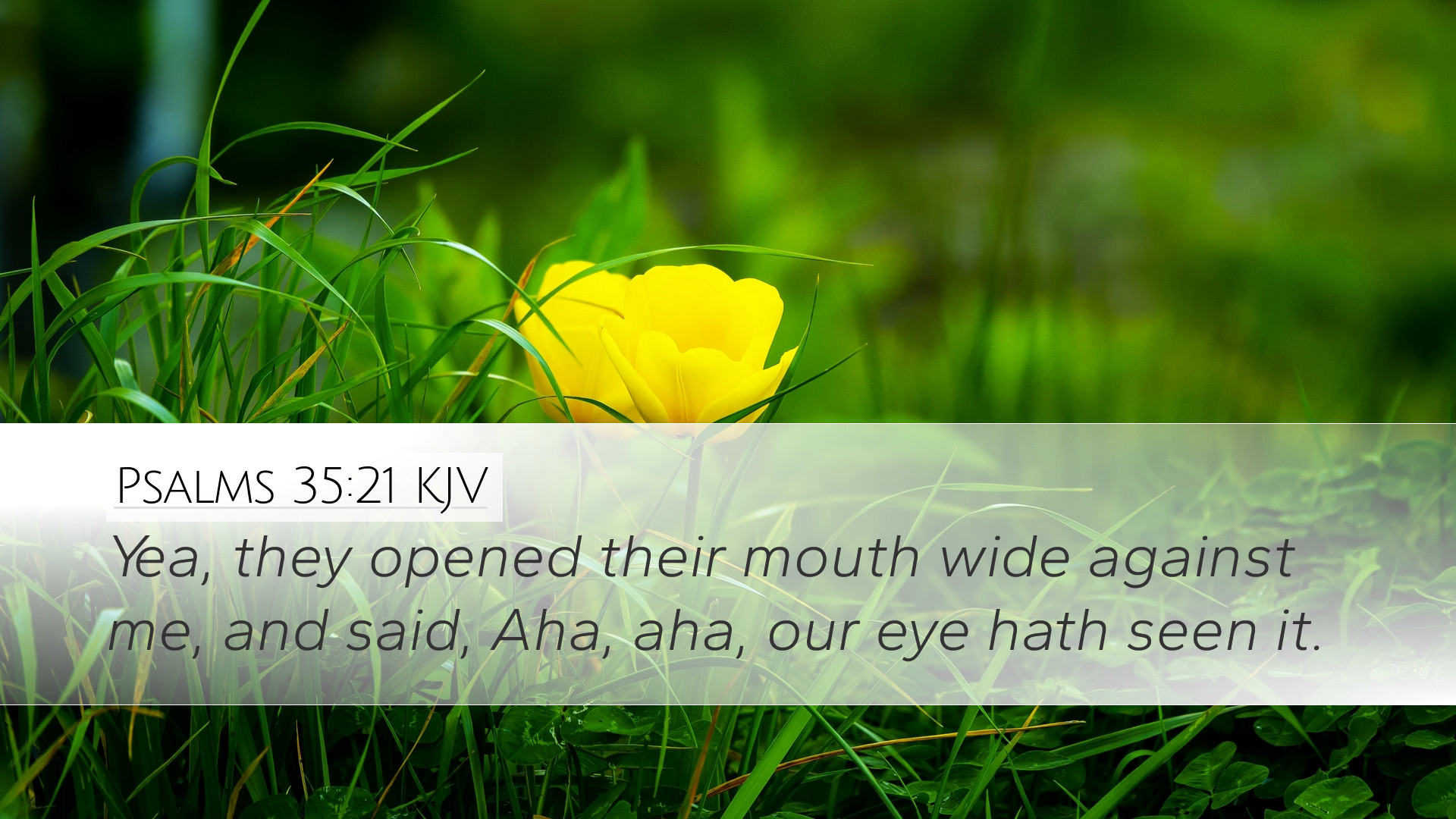Commentary on Psalms 35:21
Bible Verse: "Yea, they opened their mouth wide against me, and said, Aha, Aha, our eye hath seen it." (Psalms 35:21)
Contextual Overview
The psalmist, traditionally attributed to David, is addressing the deep sense of injustice and betrayal he feels from his enemies. This particular verse captures a climactic moment in an ongoing conflict, illustrating not just personal anguish but the communal accusation and scorn directed toward him. The employ of 'Aha, Aha' serves as a mocking refrain, emphasizing their delight in his misfortune.
Matthew Henry's Commentary
Matthew Henry emphasizes the psalmist's lamentation over false accusations. He notes that the enemies "opened their mouth wide," which indicates a loud, boisterous ridicule aimed at undermining the psalmist's integrity. This vivid imagery encapsulates the depth of scorn and derision.
Henry further suggests that this mockery is not solely an attack on the individual but instead represents an affront to God's righteousness, as the psalmist is a defender of God's rights. The desire of the wicked to see the fall of the righteous reflects a greater cosmic battle between good and evil.
Key Insights from Henry
- Public Accusation: The verse highlights the nature of public humiliation and ridicule. It serves as a cautionary tale, reminding readers that attacks on God's servants often come with collective hostility.
- Divine Justice: Henry assures that while the psalmist experiences immediate despair, ultimate justice will prevail as God observes these injustices.
- Personal Reflection: The psalmist’s personal feelings of being wronged can resonate with anyone who experiences derision or misunderstanding in their faith journeys.
Albert Barnes' Commentary
Albert Barnes contextualizes this verse within the framework of David's life, particularly his trials with King Saul and his critics. Barnes remarks that the enemies' open declaration of their triumph implies a belief that they have the upper hand over the psalmist.
He identifies the phrase "our eye hath seen it" as an indication of a smug satisfaction, suggesting that the adversaries feel they have garnered enough evidence to deceive others about the psalmist's character. This speaks to the themes of perception, reality, and the potential for misjudgment within community dynamics.
Key Insights from Barnes
- Scoffing as a Weapon: The use of mocking speech in spiritual warfare serves as a tool for the enemies of God's people; it is both an encouragement to the wicked and a disheartening tactic against believers.
- Witness to Injustice: The sense that the enemies believe they are legitimate witnesses to the righteous’ downfall reminds readers of the importance of discernment in evaluating situations and motives.
- God's Omniscience: Despite the psalmist’s distress, it remains steadfast that God observes all, promising vindication and restoration for the righteous.
Adam Clarke's Commentary
Adam Clarke provides an in-depth exegesis of the imagery presented in this verse. He remarks on the emotional weight behind the phrase "opened their mouth wide," relating it to the expressions of glee that enemies often exhibit when they perceive opportunity against a rival.
Clarke's analysis of "Aha, Aha" notes how such expressions of derision may be commonplace among the wicked, yet they are shallow, often revealing a deeper insecurity masked by their ridicule. Clarke urges scholars to recognize the psychological dynamics at play in these interpersonal conflicts.
Key Insights from Clarke
- Psychological Observation: Clarke invites pastors and theologians to consider the psychology of mocking; those who deride often do so to cover their weakness.
- The Nature of Conflict: The verse illustrates the typical opposition the faithful face—oppression brings about various forms of response, and often mockery serves as a way to assert dominance.
- Hope in Despair: The psalmist’s experience, albeit painful, is a reminder of the need for unwavering faith in God despite the deceivers' apparent victory.
Theological Implications
This verse encapsulates a core aspect of the human experience within the faith community: the visceral attack upon one's character and integrity. It raises crucial questions regarding the nature of injustice and the response of believers when faced with slander and assault.
The interplay of mockery and righteous indignation not only provides insight into the psalmist's predicament but also serves as a framework for understanding the necessary reliance on God’s sovereignty and support in times of trouble.
Conclusion
The interpretation of Psalms 35:21 invites a deep reflection on the experiences of the faithful when confronted with open ridicule from adversaries. The cumulative insights from Henry, Barnes, and Clarke provide broader theological and practical conclusions that can empower ministers and scholars to navigate similar crises in their ministries and spiritual lives.


